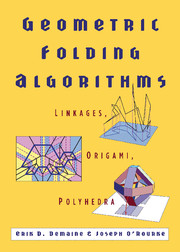0 - Introduction
Published online by Cambridge University Press: 07 September 2010
Summary
The topic of this book is the geometry of folding and unfolding, with a specific emphasis on algorithmic or computational aspects. We have partitioned the material into three parts, depending on what is being folded or unfolded: linkages (Part I, p. 7–164), paper (Part II, p. 165–296), and polyhedra (Part III, p. 297–441). Very crudely, one can view these parts as focusing on one-dimensional (1D) objects (linkages), 2D objects (paper), or 3D objects (polyhedra). The 1D–2D–3D view is neither strictly accurate nor strictly followed in the book, but it serves to place related material nearby.
One might classify according to the process. Folding starts with some unorganized generic state and ends with a more structured terminal “folded state.” Unfolding is the reverse process, but the distinction is not always so clear. Certainly we unfold polyhedra and we fold paper to create origami, but often it is more useful to view both processes as instances of “reconfiguration” between two states.
Another possible classification concentrates on the problems rather than the objects or the processes. A rough distinction may be drawn between design problems—given a specific folded state, design a way to fold to that state, and foldability questions—can this type of object fold to some general class of folded states. Although this classification is often a Procrustean bed, we follow it below to preview specific problem instances, providing two back-to-back minitours through the book's 1D–2D–3D organization.
- Type
- Chapter
- Information
- Geometric Folding AlgorithmsLinkages, Origami, Polyhedra, pp. 1 - 6Publisher: Cambridge University PressPrint publication year: 2007



